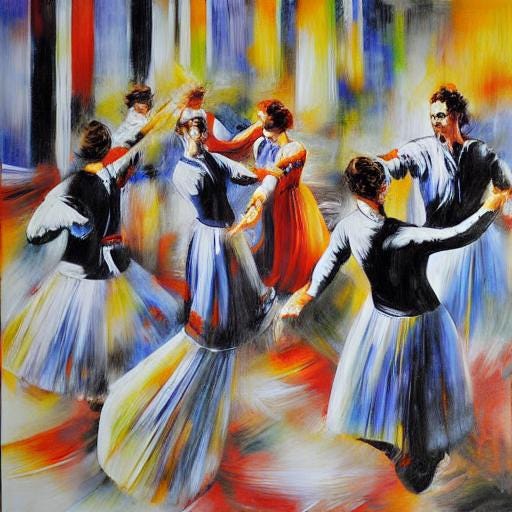Many years ago, before I retired, I used to teach an out-patient course on Mindfulness, the actual practice and real life utilization of being present to our inner and outer worlds. For half of my life, I have practiced mindfulness as both a spiritual practice in Buddhism and as a cognitive skill. These days it is not a sitting practice but simply a way of being, as basic as walking. And as in walking, there may be a stumble or slip from time to time but usually it is done naturally and without forethought.
I recognize this state of being as the bedrock of living in the full catastrophe of life. Do you recall seeing “Zorba the Greek”? Or perhaps reading the well known quote, “Am I not a man? And is a man not stupid? I'm a man, so I married. Wife, children, house, everything. The full catastrophe.” But what does The Full Catastrophe mean? Jon Kabat -Zinn interprets it best; “Catastrophe’ here does not mean disaster. Rather it means the poignant enormity of our life experience.”
The older I become, the more I see, hear or read examples of the truth of that statement. Two recent ones come to mind. First is the beautiful and moving post by
writing “What We Lose, and What We Hold”. The second is the life circumstance of a Sister Friend who is experiencing the wrenching saga of her eldest daughter leaving and returning again to a life involving domestic violence and then leaving once more while at the same time, her youngest son in mid-life has just experienced the birth of his first daughter. Each is holding dichotomous situations of their beloveds. And since I first wrote this piece, I myself am experiencing both a time of loving where I am in life and being quite happy while at the same time mourning my Sister Friend who finally has transitioned from this world after so much suffering. Still I am able to honestly say I can hold both. It can be done, I assure you.In Buddhist thought, our mundane life and the Wheel of Samsara centers around four pairs of opposites known as the Eight Worldly Concerns: Gain and Loss, Pleasure and Pain, Praise and Blame, and Fame and Disgrace. All are unavoidable. The chance to develop equanimity in our lives, to embrace the Full Catastrophe is by showing up and being present to these Eight Worldly Concerns.
Pema Chodron is an American Tibetan Buddhist nun who has many wise words to impart. Coincidentally we both practiced at the same meditation center although not at the same time. One of the things she says is this, “We think that the point is to pass the test or overcome the problem, but the truth is that things don’t really get solved. They come together and they fall apart. Then they come together again and fall apart again. It’s just like that. The healing comes from letting there be room for all of this to happen: room for grief, for relief, for misery, for joy.”
Being present is not easy for anyone. It involves not only allowing in the joy and laughter but also the face to face encounters of fears and aversion. Rilke says this succinctly:
”Let everything happen to you
beauty and terror.
Just keep going,
No feeling is final’”
In my own life I have found that both beauty and terror can be equally difficult. Often terror and aversion seem more obviously to be the hard ones but sometimes it is beauty. Perhaps you know what I mean by this. It is the fear that anything too wonderful or beautiful won’t last. And certainly it will not. We know that and are reminded seeing the beauty in the Spring…all those flowering trees, the cherry in particular, grace us with their petals and then the petals fall to the ground and are blown or swept away. We need more than a dollop of grace to keep our hearts open anyway. What our spirits need to survive is not toughness or armoring but largeness, making room for both terror and beauty.
I once read that we should try keeping two journals; one for gratitude, the other for gripes. I already keep two journals; one is a Dream Journal and the other is the daily Morning Pages. I know I won’t be adding two more but I understand what the writer was getting at. We are familiar with the gratitude journal; what the gripe journal would do is to diffuse fear and pain’s power over us. So that’s a thought if you are needing more equanimity to embrace the Full Catastrophe.
I could not end without mentioning the name of Nikos Kazantzakis the Greek journalist, poet, playwright, politician, philosopher and author (1883-1957). Such a giant among Men. His marvelous “Zorba the Greek” encapsulates the Greek culture as well as philosophy and the complexities of human nature. One of my favorite Zorba quotes is this: “But the secret is this: step lightly with your toes, for life is rare.”






Wise words to hold near when our expectations are disappointed with what is.
I'm sorry for the loss of your Sister Friend, Frances. Her memory is a blessing.